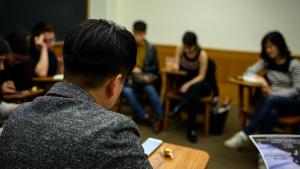Christian academics often feel misunderstood and alone, "aliens in a strange land," as University of Wyoming professor Chip Kobulnicky describes in both the church and the academy. Steve Classen, previously professor of Television, Film and Media Studies at Cal State LA, now at George Fox University, shares his experience:
I feel a double-loneliness in what I do. In my church I feel lonely because most Christians don’t seem particularly interested in what I do in higher education; most Christians aren’t particularly invested in intellectual work; they don’t understand what it’s like to teach on a secular university campus; I appreciate my church, I appreciate my pastor; I’m even in leadership in my church—but my church-life rarely touches my professional life, and so I feel lonely as a professor in my church.
I also feel lonely on my campus as a Christian—so much of what shapes the way I think about and understand the world, culture, history, the issues of the day are determined by my Christian faith and understanding, but in my secular university campus, no one seems interested in that—it just isn’t part of the professional conversation. So in my church I am lonely as a professor, and on my campus I am lonely as a Christian.
The potential for isolation on campus is probably understood by non-academics, as there is often a sense in church communities that the university is hostile to a Christian worldview. What may not be understood as well is how isolating it can be to be an academic in the church. A professor on the West Coast describes the situation he and his wife, both research scientists, find in their Christian circles:
I don't know if [the current political climate] has just emboldened the anti-intellectual Christians in America, or whether it has just made me pay more attention to them, but it certainly makes me keenly aware that I am not a typical Christian in America. This is, of course, made worse by my being an ethnic minority, but I am just talking here about the aspect of being an intellectual, an academic, and a scientist. It's not just that Christians don't seem to value scientific research, it's that it seems that a lot of them (including people in my small group at church) don't even value truth or what the Bible says, and somehow that's made it worse for those of us who spend our time poring over texts or experimental results, searching for profound and meaningful truths.
As he alludes to, in addition to this phenomenon of double loneliness—as a Christian in the academy and as an academic in the church—this sense of isolation may be tripled or quadrupled as we add in being an ethnic minority, being a woman in a mostly male field, being single when most have partners, etc. The list goes on.
Take Heart and Take Action
The truth is that isolation and loneliness are conditions we all experience to different degrees. Loneliness is part of the human condition, even for Christians. But there are ways to mitigate the loneliness of being an academic who is a Christian. These options are not available to all or even possible for some, but they are strategies that for many have met the longing for an understanding and supportive community.
1) Get thee to a faculty conference hosted by InterVarsity! Steve Classen finds these events to be essential for his life as a Christian academic: “Do you know why I come each year to this conference? It is one of the few places I don’t feel lonely! I am with fellow Christian professors who care deeply about their faith and about their specialization—who care about the life of the mind and about working out Christian discipleship in the workplace. This is one of the places I am not alone as a Christian professor in higher education!” These gatherings have been places of deep connection for faculty families as well; see Confessions of a Faculty Spouse.
2) Pray for and seek out a connection with other Christians at your institution. If there is an InterVarsity or other parachurch organization on your campus, staff can be connectors to other Christian faculty and staff. Gathering with just one or two others for prayer can be the beginning of a supportive community.
3) Pray for and seek out connections with other Christian faculty in your vicinity. One example is described by InterVarsity Faculty Ministry Director Kathy Tuan-Maclean writing of the origins of the Boston Faculty Fellowship. Charles Barker leads a prayer group for Christian faculty from several campuses on the West Coast.
4) Pray for and seek out Christians within your field, though not necessarily at your institution or in your vicinity. See You Are Not Alone: A Network of Christian Academics and a listing of Christian Professional and Academic Societies (Please let us know if you have additional groups to add to this or an update to make.).
5) Consider ways to make connections within your local church. Loneliness specifically within the church is addressed by mentors at The Well in Lonely as an Academic in Church? and by Andy Crouch in his article What I Wish My Pastor Knew About... The Life of a Scientist. Suggestions include investing more strategically in a church, seeking a different church, sharing concerns with pastoral staff, and coming to peace with finding in other places the supportive Christian fellowship that understands your academic role.
6) Connect or reconnect with friends from graduate school. Grad school is often the place where deeply meaningful Christian relationships within academia are established. One woman academic describes her relationships with these friends—now scattered across the US—as her lifeblood. As her children grew and her career was established, she began reconnecting with friends from grad school as she found she deeply missed the connection with people who would understand her situation as an academic and a Christian. “I have one friend,” she says, “who will just text me in the middle of the day, asking how I'm doing.” These connections can be life-sustaining.
7) Connect with Christian academics worldwide. To take part in worldwide conversations of Christian academics on apologetics, social concerns, justice issues, identity, integration of faith with learning, engagement with the university, etc., subscribe to the IFES-ENGAGE-UNIVERSITY listserve.
You Are Not Alone
Charles Barker, Faculty Ministry staff on the West Coast, spoke to Christian academics attending the West Coast Faculty Conference. His words are a fitting summary:
I say to each of you, “You are not alone here! You are among people for whom our faith matters greatly, Jesus matters greatly, and also where the intellectual life and the great issues of thought and culture matter greatly!
"And we are utterly confident that God is here and that God will meet with each of us and all of us together to inspire and encourage, to strengthen and renew, to guide us into whatever next steps we are taking in our lives, in our faith-journey, and in our vocational discipleship, and to help us make new connections with kindred spirits."
Whether at an InterVarsity Faculty Conference, with a small group on or off campus, in gatherings at professional meetings, reconnecting with old friends, or engaging with a listserve of academics around the world, we pray you will be able to, through our Lord Jesus Christ, make connection with kindred spirits for the sake of the gospel and God’s work in the world.



